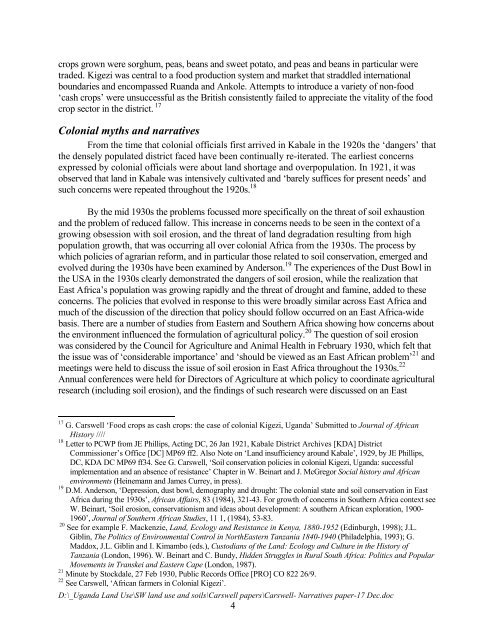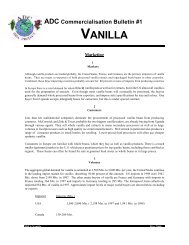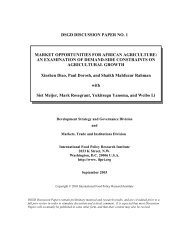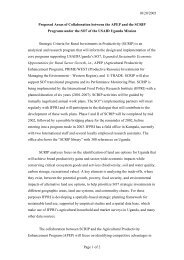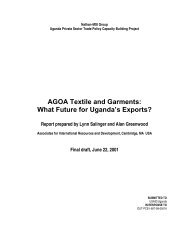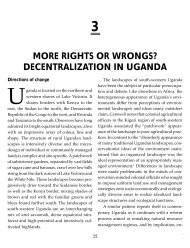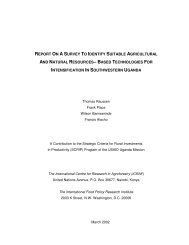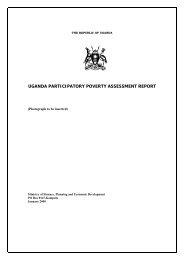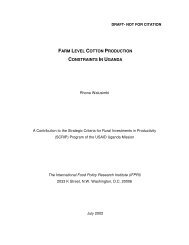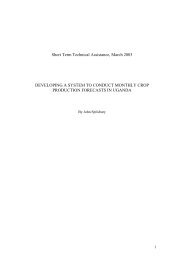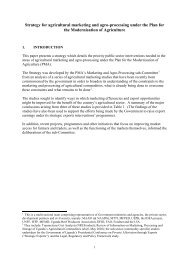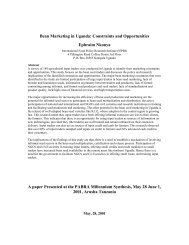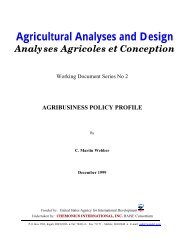Continuities in environmental narratives, Kabale, Uganda ... - Foodnet
Continuities in environmental narratives, Kabale, Uganda ... - Foodnet
Continuities in environmental narratives, Kabale, Uganda ... - Foodnet
You also want an ePaper? Increase the reach of your titles
YUMPU automatically turns print PDFs into web optimized ePapers that Google loves.
crops grown were sorghum, peas, beans and sweet potato, and peas and beans <strong>in</strong> particular were<br />
traded. Kigezi was central to a food production system and market that straddled <strong>in</strong>ternational<br />
boundaries and encompassed Ruanda and Ankole. Attempts to <strong>in</strong>troduce a variety of non-food<br />
‘cash crops’ were unsuccessful as the British consistently failed to appreciate the vitality of the food<br />
crop sector <strong>in</strong> the district. 17<br />
Colonial myths and <strong>narratives</strong><br />
From the time that colonial officials first arrived <strong>in</strong> <strong>Kabale</strong> <strong>in</strong> the 1920s the ‘dangers’ that<br />
the densely populated district faced have been cont<strong>in</strong>ually re-iterated. The earliest concerns<br />
expressed by colonial officials were about land shortage and overpopulation. In 1921, it was<br />
observed that land <strong>in</strong> <strong>Kabale</strong> was <strong>in</strong>tensively cultivated and ‘barely suffices for present needs’ and<br />
such concerns were repeated throughout the 1920s. 18<br />
By the mid 1930s the problems focussed more specifically on the threat of soil exhaustion<br />
and the problem of reduced fallow. This <strong>in</strong>crease <strong>in</strong> concerns needs to be seen <strong>in</strong> the context of a<br />
grow<strong>in</strong>g obsession with soil erosion, and the threat of land degradation result<strong>in</strong>g from high<br />
population growth, that was occurr<strong>in</strong>g all over colonial Africa from the 1930s. The process by<br />
which policies of agrarian reform, and <strong>in</strong> particular those related to soil conservation, emerged and<br />
evolved dur<strong>in</strong>g the 1930s have been exam<strong>in</strong>ed by Anderson. 19 The experiences of the Dust Bowl <strong>in</strong><br />
the USA <strong>in</strong> the 1930s clearly demonstrated the dangers of soil erosion, while the realization that<br />
East Africa’s population was grow<strong>in</strong>g rapidly and the threat of drought and fam<strong>in</strong>e, added to these<br />
concerns. The policies that evolved <strong>in</strong> response to this were broadly similar across East Africa and<br />
much of the discussion of the direction that policy should follow occurred on an East Africa-wide<br />
basis. There are a number of studies from Eastern and Southern Africa show<strong>in</strong>g how concerns about<br />
the environment <strong>in</strong>fluenced the formulation of agricultural policy. 20 The question of soil erosion<br />
was considered by the Council for Agriculture and Animal Health <strong>in</strong> February 1930, which felt that<br />
the issue was of ‘considerable importance’ and ‘should be viewed as an East African problem’ 21 and<br />
meet<strong>in</strong>gs were held to discuss the issue of soil erosion <strong>in</strong> East Africa throughout the 1930s. 22<br />
Annual conferences were held for Directors of Agriculture at which policy to coord<strong>in</strong>ate agricultural<br />
research (<strong>in</strong>clud<strong>in</strong>g soil erosion), and the f<strong>in</strong>d<strong>in</strong>gs of such research were discussed on an East<br />
17<br />
G. Carswell ‘Food crops as cash crops: the case of colonial Kigezi, <strong>Uganda</strong>’ Submitted to Journal of African<br />
History ////<br />
18<br />
Letter to PCWP from JE Phillips, Act<strong>in</strong>g DC, 26 Jan 1921, <strong>Kabale</strong> District Archives [KDA] District<br />
Commissioner’s Office [DC] MP69 ff2. Also Note on ‘Land <strong>in</strong>sufficiency around <strong>Kabale</strong>’, 1929, by JE Phillips,<br />
DC, KDA DC MP69 ff34. See G. Carswell, ‘Soil conservation policies <strong>in</strong> colonial Kigezi, <strong>Uganda</strong>: successful<br />
implementation and an absence of resistance’ Chapter <strong>in</strong> W. Be<strong>in</strong>art and J. McGregor Social history and African<br />
environments (He<strong>in</strong>emann and James Currey, <strong>in</strong> press).<br />
19<br />
D.M. Anderson, ‘Depression, dust bowl, demography and drought: The colonial state and soil conservation <strong>in</strong> East<br />
Africa dur<strong>in</strong>g the 1930s’, African Affairs, 83 (1984), 321-43. For growth of concerns <strong>in</strong> Southern Africa context see<br />
W. Be<strong>in</strong>art, ‘Soil erosion, conservationism and ideas about development: A southern African exploration, 1900-<br />
1960’, Journal of Southern African Studies, 11 1, (1984), 53-83.<br />
20<br />
See for example F. Mackenzie, Land, Ecology and Resistance <strong>in</strong> Kenya, 1880-1952 (Ed<strong>in</strong>burgh, 1998); J.L.<br />
Gibl<strong>in</strong>, The Politics of Environmental Control <strong>in</strong> NorthEastern Tanzania 1840-1940 (Philadelphia, 1993); G.<br />
Maddox, J.L. Gibl<strong>in</strong> and I. Kimambo (eds.), Custodians of the Land: Ecology and Culture <strong>in</strong> the History of<br />
Tanzania (London, 1996). W. Be<strong>in</strong>art and C. Bundy, Hidden Struggles <strong>in</strong> Rural South Africa: Politics and Popular<br />
Movements <strong>in</strong> Transkei and Eastern Cape (London, 1987).<br />
21<br />
M<strong>in</strong>ute by Stockdale, 27 Feb 1930, Public Records Office [PRO] CO 822 26/9.<br />
22<br />
See Carswell, ‘African farmers <strong>in</strong> Colonial Kigezi’.<br />
D:\_<strong>Uganda</strong> Land Use\SW land use and soils\Carswell papers\Carswell- Narratives paper-17 Dec.doc<br />
4


